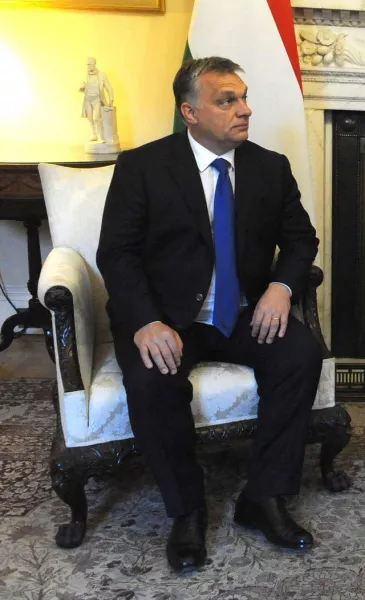Poles are voicing fears that a drawn-out conflict with the EU could put Poland on a path towards departure from the bloc.
Poland’s conservative government, led by Jaroslaw Kaczynski’s Law and Justice party, denies that it has ever wanted to leave the 27-member bloc and popular support for EU membership runs extremely high.
But critics fear the combative tone of Polish leaders – who have recently compared the EU to the Soviet Union and used terms like “political enslavement” to describe Poland’s predicament in the stand-off – could create momentum that could lead to an accidental “Polexit”.
The fears are rooted in a threat by the Polish and Hungarian governments to block the EU’s 1.82 trillion-euro budget for the next seven years, including a coronavirus recovery package.

The veto threat comes after other EU members voted to introduce a new rule that would allow the bloc to cut funding to EU nations that violate the rule of law.
Both countries, under their nationalist right-wing governments, have eroded judicial and media independence, creating concerns about democratic backsliding.
That issue will be debated at a summit of EU leaders on Thursday and Friday.
Similar concerns about a “Huxit” are mirrored to a lesser extent in Hungary, where the government has often portrayed the EU in Brussels as a foreign, despotic power that aims to bend Hungary to its will – especially on immigration.
In November, Hungarian Prime Minister Viktor Orban echoed Polish parallels between the EU and Soviet Union, saying the EU budget’s rule of law conditions resembled the “ideological blackmail” practised by the USSR.

But both Poland and Hungary are so dependent on EU funding – and their populations so favourable towards the freedom it gives their workers to cross borders – that it seems unlikely they would ever truly take the self-defeating step of leaving.
Still, Polish critics have been urging the government to choose a more conciliatory path, arguing that if Poland ever finds itself outside the EU, its difficult geographic position in central Europe would leave it vulnerable like Ukraine and Belarus, exposed to the Kremlin’s considerable influence.
“Due to its position, Poland cannot be neutral,” senate speaker Tomasz Grodzki of the opposition Civic Platform party said in a nationally televised address on November 27 in which he appealed to the government to drop its tough position.
He said: “Either it is in the family of Western civilization or among the authoritarian dictatorships of the East.”
The ruling party countered that Mr Grodzki has no authority to conduct foreign policy and that his position is harmful because it contradicts the government’s official negotiating position.
Both Polish and Hungarian governments argue they are actually the ones upholding rules set out in the EU treaty, which does not contain a mechanism to link funding to rule of law.
As the governments in Poland and Hungary dig into their stance, other EU countries have begun considering options that would allow the bloc’s 25 other nations to launch the coronavirus recovery plan without them.
The fears of a hypothetical Polexit are fuelled by Brexit, the UK’s messy divorce from the EU, which is seen as accidental. It was set in motion when former British prime minister David Cameron called for a referendum, actually intending to keep the EU in, but lost the vote.
Those who see Polexit as extremely unlikely point to the very different national perceptions of EU membership.
For the British, EU membership mainly brought access to a larger market, and with that came regulations and costs deemed burdensome by many.
But for Poles, joining the EU in 2004 – five years after joining Nato – ushered them fully into the Western fold after decades of Soviet-imposed authoritarian rule. It also opened up enormous opportunities for Polish workers to earn higher wages abroad.
“Our emotional attachment is stronger than in the UK,” said Piotr Buras, director of the Warsaw office of the European Council on Foreign Relations.
If the Polish government would ever decide to leave the EU for ideological and political reasons, it would essentially mark the rejection of the Western democratic model of society and politics, he said.
“I cannot imagine Poland outside of the European Union remaining a democratic and liberal country,” Mr Buras said. But he also argued that “Poles would never tolerate a government that would basically decide to leave the European Union in order to stay in power.”
Warsaw stands to lose billions of euro if it is bypassed in the coronavirus recovery fund. Also at risk are study abroad plans by Polish students for the next academic year as part of the popular Erasmus exchange programme.

Poland’s three living former presidents, noting their own long efforts to build a democratic nation, asked the government in a joint appeal this week “to stop blackmailing other European Union countries”.
“This is harmful to Poland and its place in a united Europe,” Lech Walesa, Aleksander Kwasniewski and Bronislaw Komorowski wrote.
Last week 50 Polish cities turned off lights on key buildings, bridges and other landmarks, symbolically showing the darkness that would come if municipalities are stripped of EU development funds.
Mr Grodzki had a warning for the nationalist government.
He said: “If you cause Poland to lose gigantic money for further development and reconstruction, if you also lead us out of our European home, history and the people will not forgive you.”







